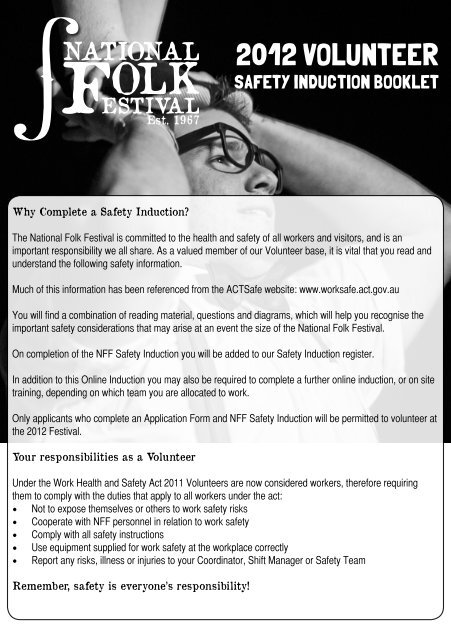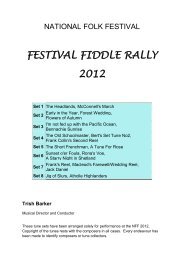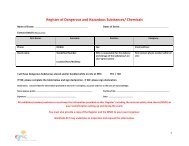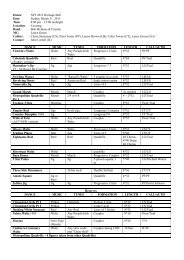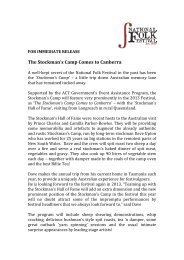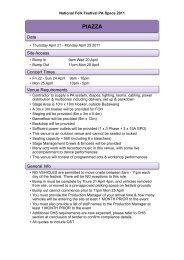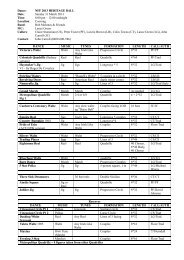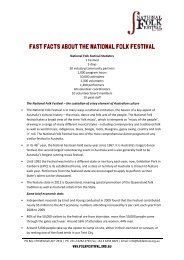2012 Volunteer Safety Induction Booklet - National Folk Festival
2012 Volunteer Safety Induction Booklet - National Folk Festival
2012 Volunteer Safety Induction Booklet - National Folk Festival
You also want an ePaper? Increase the reach of your titles
YUMPU automatically turns print PDFs into web optimized ePapers that Google loves.
<strong>2012</strong> VOLUNTEER<br />
SAFETY INDUCTION BOOKLET<br />
Why Complete a <strong>Safety</strong> <strong>Induction</strong>?<br />
The <strong>National</strong> <strong>Folk</strong> <strong>Festival</strong> is committed to the health and safety of all workers and visitors, and is an<br />
important responsibility we all share. As a valued member of our <strong>Volunteer</strong> base, it is vital that you read and<br />
understand the following safety information.<br />
Much of this information has been referenced from the ACTSafe website: www.worksafe.act.gov.au<br />
You will find a combination of reading material, questions and diagrams, which will help you recognise the<br />
important safety considerations that may arise at an event the size of the <strong>National</strong> <strong>Folk</strong> <strong>Festival</strong>.<br />
On completion of the NFF <strong>Safety</strong> <strong>Induction</strong> you will be added to our <strong>Safety</strong> <strong>Induction</strong> register.<br />
In addition to this Online <strong>Induction</strong> you may also be required to complete a further online induction, or on site<br />
training, depending on which team you are allocated to work.<br />
Only applicants who complete an Application Form and NFF <strong>Safety</strong> <strong>Induction</strong> will be permitted to volunteer at<br />
the <strong>2012</strong> <strong>Festival</strong>.<br />
Your responsibilities as a <strong>Volunteer</strong><br />
Under the Work Health and <strong>Safety</strong> Act 2011 <strong>Volunteer</strong>s are now considered workers, therefore requiring<br />
them to comply with the duties that apply to all workers under the act:<br />
• Not to expose themselves or others to work safety risks<br />
• Cooperate with NFF personnel in relation to work safety<br />
• Comply with all safety instructions<br />
• Use equipment supplied for work safety at the workplace correctly<br />
• Report any risks, illness or injuries to your Coordinator, Shift Manager or <strong>Safety</strong> Team<br />
Remember, safety is everyone’s responsibility!
<strong>National</strong> <strong>Folk</strong> <strong>Festival</strong> Chain of Command<br />
Managing Director<br />
<strong>Festival</strong> Staff<br />
Duty Manager<br />
Area Assistant<br />
Coordinator<br />
(or Shift Manager)<br />
<strong>Volunteer</strong>s<br />
General <strong>Safety</strong> Considerations<br />
Bullying – bullying is repeated unreasonable behaviour directed towards a worker or a group of workers that<br />
has the potential to cause harm to the health and safety of the worker or workers. Unreasonable behaviour is<br />
behaviour that is offensive, humiliating, degrading or threatening.<br />
To prevent bullying please ensure you:<br />
• Be respectful & courteous<br />
• Be inclusive & tolerant<br />
• Support others who are bullied<br />
• Report bullying to your Coordinator or Shift Manager<br />
If you feel like you are the victim of bullying, please:<br />
• Talk to your Coordinator, Shift Manager or <strong>Festival</strong> Staff<br />
• Approach the person<br />
For more information on Bullying and/or Harassment please refer to the NFF Workplace Bullying and Harassment<br />
Policy<br />
Fatigue – if you feel fatigue taking over then talk to your Coordinator or Shift Manager. Make sure you vary<br />
your tasks and take regular breaks.<br />
Stress – all work involves some responsibilities, problems, expectations and pressures. Stress is a persons<br />
reaction to these demands. If you fee like you can’t cope please talk to your Coordinator or Shift Manager.
Working with People - Customer service & Handling Complaints - Remember it’s not you personally that’s<br />
the problem…it’s the problem itself!<br />
• Stay calm and in control<br />
• Listen carefully<br />
• Display empathy<br />
• Identify the issue<br />
• Do not apportion the blame<br />
• Resolve the problem<br />
• Seek assistance from your Coordinator or Shift Manager<br />
Mandatory Site Requirements<br />
• Obey all safety signs and barricading<br />
• Do not enter Construction areas unless you hold the appropriate certification<br />
• Always obey speed, parking and vehicular restrictions. Speed limit in Entertainment Zone 10kph, 20kph<br />
campground.<br />
• Do not enter unauthorised or restricted areas at any time<br />
• Name badges must be worn during all shifts, unless you are working in an area/situation where the<br />
badge may endanger the person wearing it. In this instance, the badge must still be on the volunteer and<br />
the volunteer must be able to produce the badge if requested to do so.<br />
• Smoking is not permitted in any building or venue in the <strong>Festival</strong> site<br />
• No glass is to brought into the <strong>Festival</strong> Entertainment Zone<br />
• Workers must not be under the influence of alcohol. Those who are suspected or caught being under<br />
the influence of alcohol while on shift will be asked to leave the <strong>Festival</strong> and will not be allowed to return.<br />
The person will also forfeit the option of volunteering in subsequent years.<br />
• The <strong>National</strong> <strong>Folk</strong> <strong>Festival</strong> has a zero tolerance policy to illegal substance use at the <strong>Festival</strong><br />
• Violence,bullying, sexual harassment, pranks and racial vilification are not tolerated.Offenders will be<br />
removed and the Police contacted if required.<br />
Manual Handling<br />
Manual handling is not just about lifting heavy objects, it includes any activity requiring the use of force<br />
exerted by a person to lower, push, pull, hold or restrain a person, animal or object. Placing boxes and other<br />
items on shelves, painting, gardening, cleaning, writing and typing are some examples of manual handling<br />
tasks.<br />
Manual handling injuries include:<br />
• strains and sprains<br />
• neck and back injury<br />
• slips, trips and falls<br />
• cuts, bruises and broken bones<br />
• occupational overuse syndrome (OOS), once known<br />
as RSI<br />
Ways to reduce the risk:<br />
• lighten loads (break loads into small quantities);<br />
• reduce bending, twisting, reaching movements;<br />
• use team lifting;<br />
• use mechanical assistance (eg. trolleys and adjustable<br />
height workbenches and seating); and<br />
• prevent muscle strain and fatigue. This includes<br />
warming up before working, setting aside time for<br />
rest breaks, and allowing time to gradually get used<br />
to a new job.
Slips, Trips & Falls<br />
Causes of Slips, Trips & Falls include:<br />
• Slippery surfaces<br />
• Sudden changes in floor surface and levels<br />
• Unsatisfactory lighting<br />
• Unsuitable clothing and footwear<br />
• Obstructions in work areas and access ways<br />
• Moving or falling objects<br />
Ways to reduce the risk include:<br />
• Wear appropriate footwear<br />
• Clean all spills immediately<br />
• Place “slippery floor” signs in public areas when spills are being cleaned or the floor is wet<br />
• Keep floors and walkways free of stock, boxes, cartons, equipment, electrical cords and rubbish<br />
• Maintain clear visibility when carrying loads
Hazardous Substances<br />
A hazardous substance can be any substance, whether solid, liquid or gas, that may cause harm to you. We<br />
use hazardous substances almost every day of our lives. It may be antiseptic for a cut, paint for the walls, or<br />
a cleaning product for the bathroom or toilet.<br />
They may seem harmless, but even these ordinary things can make you very sick if they are used incorrectly.<br />
Harm to health may occur suddenly, such as dizziness, nausea and itchy eyes or skin; or it may occur gradually<br />
over years, such as dermatitis or cancer.<br />
A Material <strong>Safety</strong> Data Sheet (MSDS) should be available for all hazardous substances. An MSDS must be<br />
provided to, and understood by, a person using chemicals in the workplace. The MSDS will tell you how to<br />
safely handle the chemicals.<br />
The NFF has a MSDS register for all known Hazardous Substances used at the festival. It is your responsibility<br />
to report a hazardous substance if found on site to the NFF <strong>Safety</strong> Team, so that the MSDS for that<br />
substance is added to the register and treatment procedures passed onto First Aid.<br />
Remember:<br />
• follow safe work procedures<br />
• always correctly wear the appropriate safety equipment if required<br />
• do not eat, drink or smoke while working with a hazardous substance<br />
• do not keep food or drink near the substance<br />
• wash your hands and face and other exposed areas with soap and water before going to the toilet or<br />
eating and drinking<br />
• read all safety information available to you about the substance<br />
An example of hazardous substances found at the <strong>National</strong> <strong>Folk</strong> <strong>Festival</strong> site may include, but are not limited<br />
by, the following:<br />
• paints<br />
• glue<br />
• LPG and other fuels and oils<br />
• Solvents<br />
• cleaning products<br />
• timber<br />
• dusts<br />
• synthetic mineral fibres<br />
Electrical <strong>Safety</strong><br />
• All outages, electric shocks and/or short circuits must be reported to NFF management<br />
• All portable electrical appliances, including hand tools, power boards and extension leads, MUST be<br />
tested and tagged in accordance with AS/NZS 3760:2010(Australian Standard) and display a current tag<br />
• All leads MUST be elevated at least 2m above ground wherever reasonably practicable
• All portable electrical appliances must be earthed and have a portable earth leakage circuit breaker<br />
• Disconnect broken appliances, and have frayed cords or broken power points replaced<br />
• Even after a piece of electrical equipment,appliance or machine has been disconnected from the power<br />
source, it may still partially operate. This is because of stored energy within the equipment. After disconnecting<br />
the power source, activate the machine or appliance to release the stored energy<br />
• Always switch off appliances at the power point before you pull out the plug<br />
• Keep electrical cords off the floor to reduce the risk of damage from drag or contact with sharp objects.<br />
A damaged electrical cord can cause a fatal electric shock<br />
Plant and Equipment<br />
Vehicles must NOT move in the Entertainment Zone during the festival from 8am – 11pm, and all vehicles<br />
requiring access must obtain a vehicle pass. Restricted access is granted for approved service vehicles to<br />
the service road between the back of Fitzroy and Budawang buildings only.<br />
Large plant such as scissor lifts, forklifts, boom lifts can ONLY be used by certified persons. If you do not<br />
have the appropriate licence or an Elevated Work Platform (EWP) ticket you CANNOT use them . Additional<br />
training may also be required from the NFF <strong>Safety</strong> Team before you start work, confirm with your Coordinator<br />
or <strong>Safety</strong> Team.<br />
All licences and certifications for use of Plant and Machinery MUST be presented to <strong>Festival</strong> Office and approved<br />
before an NFF vehicle licence is granted for use onsite.<br />
All keys and ignition devices for plant onsite MUST be signed into <strong>Festival</strong> Office upon completion of work.<br />
When working with mechanical equipment, Personal Protective Equipment (PPE) is to be worn, and can<br />
include protective gloves, arm guards, safety glasses, hard hats, and safety boots and harnesses.<br />
Any faulty equipment should be tagged so that it cannot be used until it is replaced or repaired. Please notify<br />
your Coordinator, Shift Manager or <strong>Festival</strong> Staff of any faulty equipment. Only the person who attached the<br />
out of service tag may remove it.<br />
Working Outdoors<br />
When working outdoors,extra provisions are to be made to prevent over exposure to UV radiation. In the<br />
ACT UV radiation peak times are between 10am – 2pm (or 11am – 3pm daylight saving time) from August –<br />
May. Sunscreen should not be used as the first measure for reducing sun damage, the most effective way of<br />
reducing UV radiation exposure is to use a combination of protection methods, including:<br />
• avoiding the UV radiation peak periods of the day<br />
• working under natural or artificial shade (awnings, trees, umbrellas, structures)<br />
• using protective clothing (long clothing, hats, sunglasses)<br />
• applying sunscreen(SPF 30+ every 2 hours)
Personal Protective Equipment<br />
All <strong>Volunteer</strong>s for the <strong>National</strong> <strong>Folk</strong> <strong>Festival</strong> must adhere to the equipment and Personal Protective Equipment<br />
(PPE) requirements for their specific area. Prior to commencing work onsite your Coordinator will advise<br />
you of these requirements, examples of which are listed below. Please be aware that if you fail to adhere<br />
to the requirements you may be asked to leave your shift.<br />
• overalls<br />
• safety hats<br />
• safety boots<br />
• safety glasses<br />
• hi-visibility vest<br />
• gloves<br />
• goggles<br />
• respirators / face mask<br />
• ear muffs / plugs<br />
• sunscreen<br />
Please be aware that if you fail to adhere to the safety requirements you may be asked to leave your shift.<br />
If you feel you are performing a task that requires safety equipment which has not been provided please<br />
notify your Coordinator immediately.<br />
Please bring appropriate PPE, ie. boots etc, with you to the site. Specialised PPE will be supplied as required.<br />
Working at Heights<br />
Ladders and stepladders should only be used for very light work where there is no danger of over reaching<br />
and the worker can steady themselves at all times. Ladders and stepladders need to be high enough for the<br />
job so that the worker does not have to stand higher than 900 mm from the top (for single and extension ladders)<br />
or the third tread from the top plate of a stepladder.<br />
If you are uncomfortable or concerned about working at heights then you should not be doing it. Before<br />
deciding to use either a ladder or stepladder the following options should be considered:<br />
• Can the job be done from the ground?<br />
• Can the job be done using an extension tool?<br />
• Are there safer options such as a temporary work platform available?<br />
• Is the ladder or stepladder in good working condition eg damaged or missing rungs/steps?
Safe Use of Ladders<br />
Ladders should only beset up on firm flat surfaces. Single and extension ladders should be fixed against<br />
movement and/or footed by another person. When using a ladder the following rules apply:<br />
• Ladders may be used at a slope of no greater than 4 in 1<br />
• Maintain three points of contact with the ladder at all times<br />
• Minimise the weight of tools<br />
• Do not place a metal ladder close to electrical wiring<br />
• Ensure nobody is working below the ladder<br />
• Do not place a ladder in front of a doorway<br />
• Do not over-reach as it may result in loss of balance<br />
• Make sure that the surface on which the ladder is placed can support the load<br />
• Do not allow more than one person on the ladder at the same time<br />
• Always face the ladder when working and moving up and down the ladder<br />
Safe Use of Stepladders<br />
As with the use of ladders, stepladders must also be in safe working order and set up on a firm level surface.<br />
A stepladder in safe working condition has clean un-damaged treads, secure locking devices and firmly attached<br />
feet to prevent movement. Do not use a stepladder in situations where a ladder is the safest option.<br />
Most of the rules applying to the use of ladders are also applicable to stepladders however there are some<br />
specific rules that apply for stepladders. They are:<br />
• Ensure that legs of the stepladder are securely locked into place<br />
• Only work on a stepladder for a maximum of 15- 30 minutes at a time<br />
• Only carry light materials and tools (up to10 kg)<br />
• Maintain both feet on the same tread at all times<br />
• Minimise side-on working<br />
Site Amenities & Facilities<br />
Toilets are located in the Budawang, Coorong, Conference Centre, Fitzroy, Mallee, Session bar & Terrace<br />
Restaurant buildings, and at Performer Camping (Gate 11), General Camping (stables), Cotter Campground,<br />
Tent Only camping, Dog Show area and Main ticket office. Showers are located in all of the above mentioned<br />
areas except in Session Bar.<br />
Disabled toilets and showers are located in the Conference Centre, Coorong, Fitzroy, Session Bar, Dog<br />
Show area and Tent Only camping (see site map)<br />
First Aid is located in Front of Building E (<strong>Festival</strong> Shop) during festival hours.<br />
After hours and pre-festival First Aid can be contacted on 0406 375 665 or through Communications on 6230<br />
7118.
GENERAL<br />
ENTRY<br />
C<br />
Morisset Road<br />
N<br />
COTTER<br />
CAMPGROUND<br />
NO ACCESS<br />
Black Water<br />
Dump Point<br />
FOWLS<br />
MAIN<br />
CAR PARK<br />
MAIN TICKET<br />
OFFICE<br />
Camping Entry & Exit<br />
C<br />
B<br />
GENERAL<br />
ENTRY<br />
VOLUNTEER/<br />
PERFORMER<br />
ENTRY<br />
No Camping - Floodway<br />
Grey Water<br />
Dump Point<br />
MAIN<br />
CAMPGROUND<br />
TENT<br />
ON LY<br />
ZONE<br />
CAMPERS<br />
PARKING<br />
A<br />
SEASON<br />
CAMPING<br />
ENTRY<br />
Wells Station Road<br />
NO ACCESS<br />
OWLS<br />
ARENA<br />
DOG<br />
SHOW<br />
NO FESTIVAL ACCESS<br />
FLEMINGTON<br />
ROAD<br />
CAR PARK<br />
STALL HOLDER<br />
ENTRY<br />
Kamberra<br />
Winery<br />
PERFORMER<br />
CAMPING<br />
Grey Water<br />
Dump Point<br />
D<br />
Grey Water<br />
Dump Point<br />
Flemington Road<br />
NO<br />
CAMPING<br />
ENTERTAINMENT<br />
ZONE<br />
Budawang<br />
<strong>Festival</strong> Shop<br />
Mallee<br />
Fitzroy<br />
TENT<br />
CITY<br />
PERFORMER<br />
CAMPING<br />
<strong>Safety</strong> Office<br />
<strong>Festival</strong> Office<br />
Communications<br />
Centre (Comms)<br />
NO ACCESS<br />
A<br />
B<br />
C<br />
D<br />
To City Centre - Northbourne Avenue Federal Highway To Sydney<br />
Showers<br />
Toilets<br />
Disabled Toilets<br />
Parking<br />
First Aid<br />
TO<br />
MAIN<br />
FESTIVAL<br />
ENTRY<br />
Season Camping Entry<br />
<strong>Volunteer</strong> & Performer Entry<br />
General Entry<br />
Stallholder Entry
Evacuation & Emergency Procedures<br />
In the case of a venue or area evacuation, <strong>Festival</strong> Wardens and Venue MC’s will direct you to a nearby assembly<br />
area. Do NOT return to an evacuated area until instructed to do so.<br />
In the event of an internal site evacuation, Venue Managers and <strong>Festival</strong> Wardens will direct you to the<br />
internal evacuation point located at the northern end of the oval/arena.<br />
In the unlikely event of a whole site evacuation, the alert will be sounded through the EPIC PA system and<br />
Venue MCs. Due to the size of the site there are two assembly areas, one located at Flemmington Rd carpark<br />
and the other at Wells Stations Rd carpark.<br />
<strong>Festival</strong> Wardens will direct you to the closest assembly area, and are identified by His-Vis vests. You must<br />
follow all instructions given by <strong>Festival</strong> Wardens at all times.<br />
GENERAL<br />
ENTRY<br />
C<br />
Morisset Road<br />
N<br />
COTTER<br />
CAMPGROUND<br />
No Camping - Floodway<br />
NO ACCESS<br />
Black Water<br />
Dump Point<br />
FOWLS<br />
Grey Water<br />
Dump Point<br />
MAIN<br />
CAMPGROUND<br />
TENT<br />
ON LY<br />
ZONE<br />
ZONE 4<br />
MAIN<br />
CAR PARK<br />
Assembly<br />
Area 3<br />
CAMPERS<br />
PARKING<br />
MAIN TICKET<br />
OFFICE<br />
Camping Entry & Exit<br />
C<br />
B<br />
GENERAL<br />
ENTRY<br />
A<br />
VOLUNTEER/<br />
PERFORMER<br />
ENTRY<br />
SEASON<br />
CAMPING<br />
ENTRY<br />
Wells Station Road<br />
NO ACCESS<br />
FLEMINGTON<br />
ROAD<br />
CAR PARK<br />
Assembly<br />
Area 2<br />
STALL HOLDER<br />
ENTRY<br />
Kamberra<br />
Winery<br />
PERFORMER<br />
CAMPING<br />
Grey Water<br />
Dump Point<br />
D<br />
Grey Water<br />
Dump Point<br />
Flemington Road<br />
OWLS<br />
ARENA<br />
ENTERTAINMENT<br />
ZONE<br />
Budawang<br />
<strong>Festival</strong> Shop<br />
ZONE 1<br />
Assembly<br />
Area 1<br />
Internal Evacuation<br />
Point<br />
ZONE 3<br />
Mallee<br />
Fitzroy<br />
TENT<br />
CITY<br />
PERFORMER<br />
CAMPING<br />
ZONE 2<br />
To City Centre - Northbourne Avenue Federal Highway To Sydney<br />
DOG<br />
SHOW<br />
NO FESTIVAL ACCESS<br />
NO ACCESS<br />
ZONES 1 & 3<br />
Evacuate to<br />
Assembly Area 2:<br />
Flemington Rd Carpark<br />
TO<br />
MAIN<br />
FESTIVAL<br />
ENTRY<br />
ZONES 2 & 4<br />
Evacuate to<br />
Assembly Area 3:<br />
Wells Station Rd Carpark<br />
(Main Carpark)
Injuries & Incident Reports<br />
All injuries and incidents on site must be reported to your Coordinator and/or Shift Manager by completing an<br />
Incident Report. Incident reports are also available from the <strong>Festival</strong> Office, Communications or the <strong>Safety</strong><br />
Team. The Incident Report must detail what you saw and the actions that you took. This can be important for<br />
maintaining a safe workplace. Incident Reports can also serve as evidence for further investigation and must<br />
be accurate accounts.<br />
Incidents include:<br />
• Identified hazards and risks<br />
• Dangerous occurrences<br />
• Near misses<br />
A Daily Hazard board located at the <strong>Safety</strong> Team demountable lists daily hazards and their location. Check<br />
regularly.<br />
Emergencies & First Aid<br />
For all life threatening Emergencies, Fire, Medical or other call 000, then notify the Communications Centre<br />
(Comms) on 6230 7118.<br />
For all other Emergencies please notify the Communications Centre immediately on 6230 7118.<br />
Pre-festival contact the Duty Manager on 0406 375 693.<br />
Upon entering the site or any buildings/venues make yourself aware of emergency exits.<br />
First Aid is available on the <strong>Festival</strong> site and is clearly marked on the <strong>Festival</strong> Map. Please take a moment to<br />
make yourself aware of the First Aid location prior to commencing your shifts.<br />
Emergency Contact Numbers:<br />
Emergency: 000 then 6230 7118<br />
Communications Centre (Comms): 6230 7118<br />
First Aid: 0406 375 665<br />
What to do if someone is injured:<br />
• Remain calm<br />
• Assess the injury<br />
• If injury is life threatening contact 000 immediately and request an ambulance. You will be asked to state<br />
your address, specific location and contact phone number<br />
• Contact <strong>Festival</strong> Management through Communications and advise them of situation, your location and<br />
actions taken<br />
• Do not move the injured party unless there is an increased risk of danger where they are currently<br />
located<br />
• Ensure the area is safe and poses no further risk, if necessary barricade the area off from the general<br />
public<br />
• Assist <strong>Festival</strong> Management, the NFF Emergency Response Officer and Ambulance when they arrive<br />
on the scene<br />
• Complete an incident report post as soon as possible post incident
Thank you for completing the<br />
<strong>2012</strong> <strong>National</strong> <strong>Folk</strong> <strong>Festival</strong><br />
<strong>Volunteer</strong> <strong>Safety</strong> <strong>Induction</strong><br />
If you would like more information please visit the<br />
WorkSafe ACT website<br />
www.worksafe.act.gov.au<br />
Please return your completed answer sheet - marked attention to<br />
the <strong>Volunteer</strong> Administrator - via the contact details at the bottom<br />
of this page<br />
<strong>National</strong> <strong>Folk</strong> <strong>Festival</strong><br />
PO Box 179 Mitchell ACT 2911<br />
Ph: 02 6262 4792 Fax: 02 6255 4825<br />
Email: voladmin@folkfestival.org.au<br />
www.folkfestival.org.au


